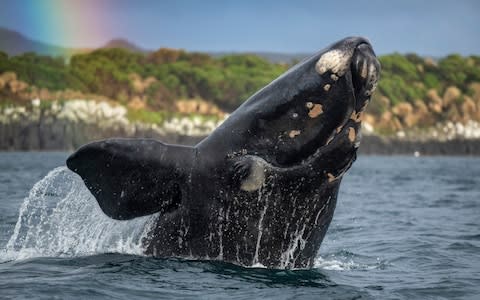Viennese grave-robbing hamsters filmed for first time in new BBC wildlife series

The mystery of why flowers keep disappearing from graves in Vienna has finally been solved by BBC film-makers who discovered wild hamsters are pilfering the bouquets.
New natural history series Seven World’s, One Planet, narrated by Sir David Attenborough, has uncovered a host of new animals and behaviours never before seen or filmed.
The exploits of thieving hamsters in Vienna’s cemeteries appears in the ‘Europe’ episode where the little mammals were spotted fighting over posies left by grieving relatives of the deceased.
Jonny Keeling, Executive Producer, said at the first screening in London earlier this month: “I didn’t really know that you got wild hamsters in Europe and they live across all of mainland Europe, and we filmed a sequence in the middle of the city in Vienna in a graveyard, where they’re feeding on flowers and things.
“There is a very funny sequence that I won’t elaborate, but it’s incredible to see these totally wild hamsters running around, so that for me was one of the highlights from Europe.”

The series also captures polar bears leaping from rocks to hunt beluga whales in Hudson Bay, a huge jellyfish being captured and eaten by sea anemones, pelicans mugging cormorants for their food in the Danube delta, singing rhinos, elephants balancing on their hind legs to reach up for leaves, and the biggest congregation of whales ever filmed.
Mr Keeling added: “In South Africa there is a waterfall and there is a bird that lives behind that waterfall and when the chicks have to fledge they’ve never seen the outside world, all they’ve seen is one of the most powerful waterfalls just pouring down in front of them and they literally have to take a leap of faith and jump through the waterfall.
“You can imagine a normal bird fledging and jumping out of the nest, that’s a leap of faith, but to do that through one of the most powerful waterfalls in the world into a planet that you’ve never seen before, I think that’s an extraordinary scene so that’s a highlight.
“There is a sequence in the North America episode of polar bears hunting beluga whales which is extraordinary, because the whales are a lot bigger than the polar bears. They are large and clever animals and the polar bears are outsmarting them.”
Much of the new footage has been captured by super-fast and quiet drones which can take discrete aerial shots, allowing for more intimate shots. Andean bears have been filmed feeding high in the trees, while dramatic footage shows leopard seals and killer whales hunting gentoo penguins in Antarctica.
Wolves have been spotted stalking deer at night in the mountains of Italy and the jottus jumping spider is captured in its complex mating dance.

Sir David said he was particularly impressed by scenes showing rare monkeys in China.
“There is a wonderful wonderful creature called the golden-haired blue-faced snub-nosed snow monkey,” he said. “I had never seen it before. I once read a scientific paper about it back in the 60s and we couldn’t get to China and in the end we dropped it and I always had it in the back of my mind I’d got back, and blow me, this lot managed it.
“They are snub nosed to stop them getting frostbitten.
“I want people to take away how fundamentally astonishing and wonderful and beautiful things are. We’ve made a tragic desperate mess of it so far but at last nations are coming together and recognising that we all live on the same planet and all these seven worlds are actually one, and we’re dependent on them for the food we eat and the air we breathe.”
Asked by a five year old in the audience how he could help save the planet, Sir David said: “The best thing to think about is don’t waste things, Don’t waste electricity, don’t waste paper don’t waste food.
“Live the way you want to live, but don’t waste. Look after the world and the animals and plants in it, it’s their world to. So don’t waste it.”

Four years in the making, the series has involved more than 1,500 people working across 41 countries, and has already been bought by China, the US, Australia, France and across Latin America. The music has been written by Hans Zimmer. The BBC has vowed to release one new natural history series each year until 2023.
BBC Director General Tony Hall said: “We all want to make sure they are seen by as many people across the world as we can.
“We’ve never had that scale of ambition before and no other broadcaster in the world comes close to that kind of commitment to the natural world. There has never been a more important time for us to bring nature’s wonders to everybody.
“I would go so far as to say the producers and crews have defined the boundaries of what we can do with drones when it comes to wildlife photography, The crew have taken them into over waterfalls, volcanoes, icebergs, and underground into caves.
“They’ve used motion controlled photography the latest thermal camera tech and filmed so many firsts.”
Seven Worlds, One Planet airs on BBC One on Sun 27th October.

 Yahoo News
Yahoo News 
